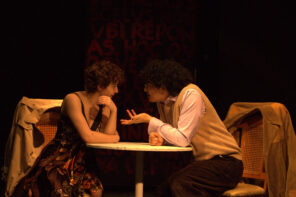
On Wednesday January 23rd, McGill Political Science professor Rex Brynen held an informal talk as the first installment of a new AUS initiative, “In the Green Room.” The subject of Wednesday’s discussion was “Games and Politics,” a topic of great interest to Professor Brynen, who operates a blog about the teaching and policy implications of games. Each year, he runs a Civil War simulation in his popular Peacebuilding course.
“Games are a form of popular culture,” Professor Brynen explained. “And like any form of popular culture they reflect society’s concerns and preoccupations.” As an example, he pointed to cases as diverse as “War on Terror” inspired first person shooters, 19th Century colonial board games, games used as recruitment tools for the US Army, and the Hezbollah-designed Special Force series.
Much of the talk was devoted to a second point of intersection between games and politics: the value of games as training material and as a means of policy testing. Brynen cautioned that there are challenges in building effective simulations. “Using a game is not necessarily more effective than standing in front of a class and going on for an hour or two. It depends on how you use it.”
Brynen generally prefers manual simulations to their computerized counterparts. “The realism and immersive nature of modern computer simulations can actually have disadvantages in that it leads players to forget they are doing a simulation. This can lead to players thinking they can use lessons from the sim in real life even when they don’t apply.”
Professor Brynen’s talk was the first of many to come. Created by Yasmeen Gholmieh, AUS VP Communications, “In the Green Room” is a planned series of informal talks by McGill professors on various subjects.
“We don’t have many opportunities to be able to interact informally with professors,” said Gholmieh, “A lot of students are in large departments and don’t get one on one experience with their professors. I also wanted an opportunity where students could listen to a topic that was not necessarily part of their field. People are super interested in these topics, but they don’t want to necessarily take a full semester course.”
This first talk with Professor Brynen attracted approximately 70 students from different departments and faculties, much less than the 130 attendees on the event’s Facebook page, but much more than the turnout originally envisioned by Gholmieh. “I imagined there would be maybe ten to fifteen people. I thought that would be a nice number just to be able to talk to a professor in a small setting rather than a lecture where the professor talks and you just listen.” This is not to say that she was disappointed. “We had a really good number, and I’m happy about that.”
The AUS plans to schedule “In the Green Room” roughly once a month, featuring different McGill professors from varying faculties and departments. While it is expected that different speakers will attract different audiences, AUS hopes that the lectures themselves will generate their own loyal audience. The next speaker scheduled is to be Robert Rutledge, a physics professor who will be discussing astronomy.
While the project is Gholmieh’s brainchild, the VP Communications states she is unlikely to return to the role next year. “I am probably not going to be staying in my position next year, so I hope my successor will keep it alive. It could either go in my portfolio – VP Communications, or someone else could start; maybe the VP Events.” “In the Green Room” occupies an unusual niche for the AUS, fitting somewhere between formal speaker events and the many party events. Gholmieh thinks of it as “a more informal, low key event, centered around academic issues, but at the same time still fun,” and adds that “it appeals to a different crowd than the DepARTmental Cup. I think it’s important that we have a diversified set of events”.
Michael Paolucci, U2 Political Science and History student, attended the event and was happy with what it represents. “In the Green Room” is a great idea. I think it’s great to see professors open up their current research to students outside of office hours.” The AUS says the initial response from professors has been similarly positive. If future talks draw similar interest, the initiative could very well become an AUS tradition.







